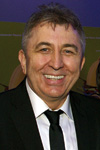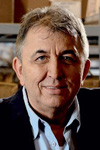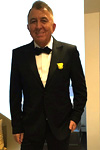|
 FERO FENIČ FERO FENIČ
(Born in Nižná Šebastová - Prešov, Slovakia), is a distinguished figure in Czech and Slovak cinema and television culture. He initially studied journalism at the Philosophical Faculty of Comenius University in Bratislava, but after three years switched to film and television documentary directing, and graduated from Prague’s Film and TV School of the Academy of Performing Arts (FAMU).
While still at school he was recognized for his documentaries (The Animal in Man, The Swan’s Journey, How Mr Kráľovič Became King) and won a residency at the prestigious Centro Sperimentale di Cinematografia in Rome, Italy.
 After making his acclaimed short-film debut Diadem, he worked for Slovak Film Production’s Short Film Studio in Bratislava, where he created works that placed him among the greatest Czechoslovak talent of that time. His short films I've Crossed the Big, Wide World, Batromij’s House and, in particular, There and Back, which in 1990 won an award for the best Czechoslovak documentary of the seventies and eighties, were exceptional. He cooperated with Slovak Television where he directed several narrative and documentary films (e.g. Shores of Grace, Village Dream and Jozef Kroner’s Life Railroad). After making his acclaimed short-film debut Diadem, he worked for Slovak Film Production’s Short Film Studio in Bratislava, where he created works that placed him among the greatest Czechoslovak talent of that time. His short films I've Crossed the Big, Wide World, Batromij’s House and, in particular, There and Back, which in 1990 won an award for the best Czechoslovak documentary of the seventies and eighties, were exceptional. He cooperated with Slovak Television where he directed several narrative and documentary films (e.g. Shores of Grace, Village Dream and Jozef Kroner’s Life Railroad).
 The documentary There and Back (1980) and the TV narrative film The Shores of Tenderness (1982) were banned from public screening until after the “velvet revolution” in 1989. The same fate met his first television documentary Little Portrait (1979, from the Fair trilogy) and his first writer-director feature-length narrative film Juice Novel produced at the Barrandov Film Studios in Prague. The documentary There and Back (1980) and the TV narrative film The Shores of Tenderness (1982) were banned from public screening until after the “velvet revolution” in 1989. The same fate met his first television documentary Little Portrait (1979, from the Fair trilogy) and his first writer-director feature-length narrative film Juice Novel produced at the Barrandov Film Studios in Prague.
In March 1986, he was accused of so-called “anti-Communist activities” and was forced to leave not only his work, but also Slovakia. He moved to Prague and for a few years made a living as a tourist guide.
 Due to the erosion of the ruling regime in the late eighties, he was able to make the internationally acclaimed short film Train to Maturity in Prague in 1989, as well as his third narrative film Strange Beings, an allegory about the fall of Communism, which in many ways predicted the events of the end of that year. Due to the erosion of the ruling regime in the late eighties, he was able to make the internationally acclaimed short film Train to Maturity in Prague in 1989, as well as his third narrative film Strange Beings, an allegory about the fall of Communism, which in many ways predicted the events of the end of that year.
His forth feature film came in 1998 as a compilation from his popular satirical TV series Czech Soda.
Between 1990 and 1994 Fero Fenič taught at the Film and TV School of the Academy of Performing Arts in Prague (FAMU).
 In December 1991 he established an independent film and television production company named FEBIO, one of the first private author platforms in the Czech Republic. Under his leadership it became the most prominent short-film studio in the country. Between 1992 and 2010, FEBIO created 1261 documentary and narrative films, including standalone projects and large series like Eye (a view of current life), GEN (Gallery of the Nation’s Elite), GENUS, How They Live…, Travel Mania, Confession, Czech Love, or the legendary satirical show Czech Soda, plus dozens of independent documentaries. In December 1991 he established an independent film and television production company named FEBIO, one of the first private author platforms in the Czech Republic. Under his leadership it became the most prominent short-film studio in the country. Between 1992 and 2010, FEBIO created 1261 documentary and narrative films, including standalone projects and large series like Eye (a view of current life), GEN (Gallery of the Nation’s Elite), GENUS, How They Live…, Travel Mania, Confession, Czech Love, or the legendary satirical show Czech Soda, plus dozens of independent documentaries.
 In 1993 Fero Fenič launched a showcase of non-commercial cinematography, Feiofest, which gradually grew into Prague’s first International Film Festival. With regional affiliates and a Slovakian counterpart Febiofest is the most attended film event in both the Czech Republic and Slovakia. Until 2012, Fero Fenič lead the festival as Executive Director, and became its President in 2013. In 1993 Fero Fenič launched a showcase of non-commercial cinematography, Feiofest, which gradually grew into Prague’s first International Film Festival. With regional affiliates and a Slovakian counterpart Febiofest is the most attended film event in both the Czech Republic and Slovakia. Until 2012, Fero Fenič lead the festival as Executive Director, and became its President in 2013.
On December 19th, 2011 he started a petition and subsequently organized a citizen initiative mobilizing tens of thousands to rename the Prague Airport in the memory of the first Czech President. The former Ruzyne airport became Václav Havel Airport Prague on October 5th, 2012.
 As a film director and producer Fero Fenič won numerous national and international awards. As a film director and producer Fero Fenič won numerous national and international awards.
To date he has authored 35 short and feature films.
He likes to travel for pleasure and has visited over 100 countries on all continents.
He lives and works in Prague, where on March 1st, 2016 he was the first film-maker in the capital’s history to be honored with the Distinguished Citizen award.
(Information compiled from press articles and film encyclopedias.)
|

